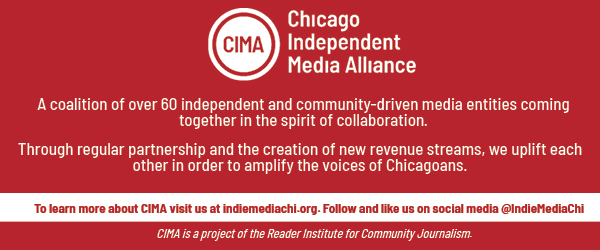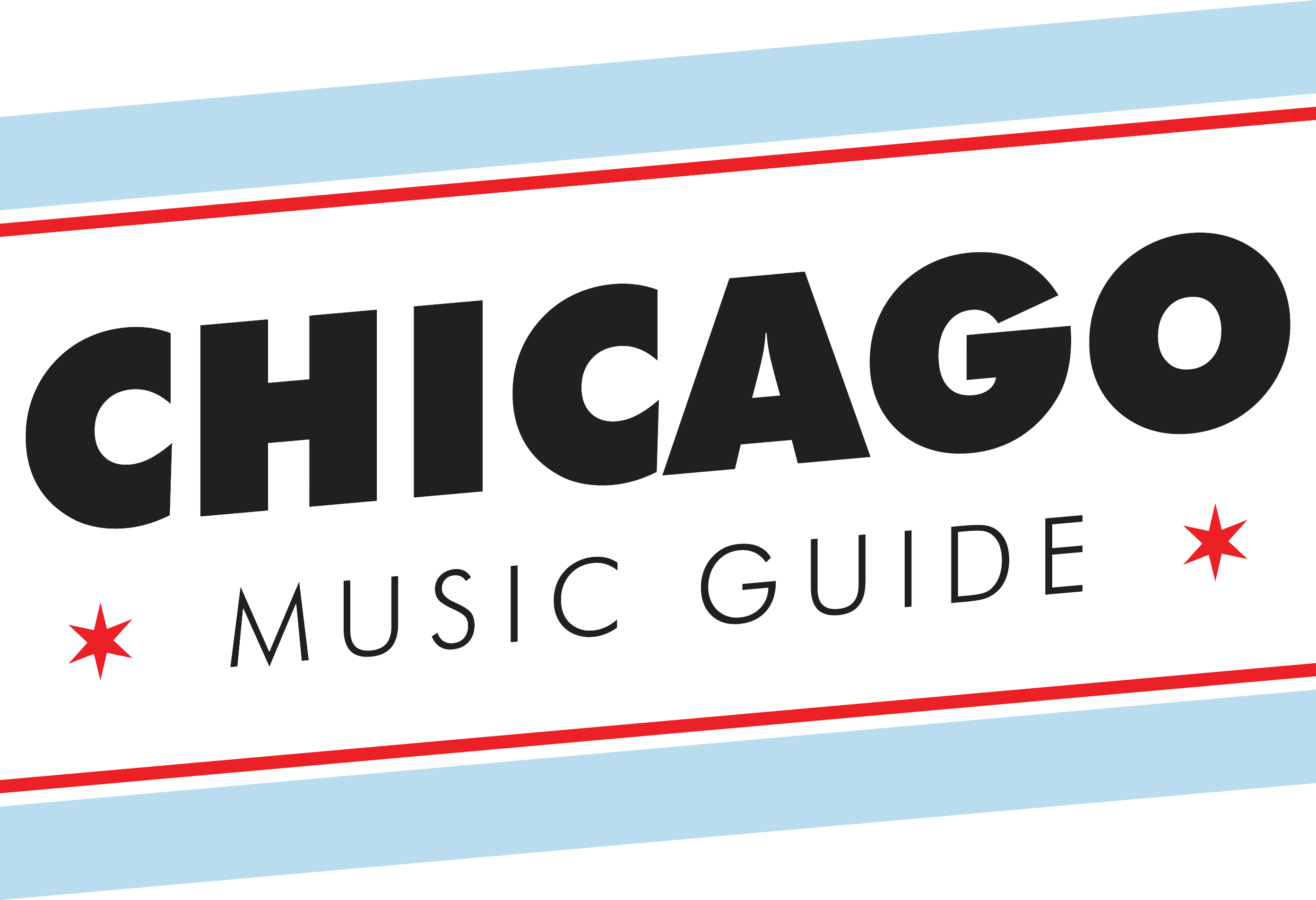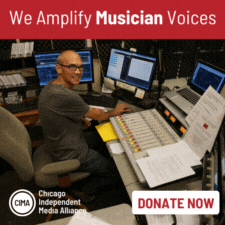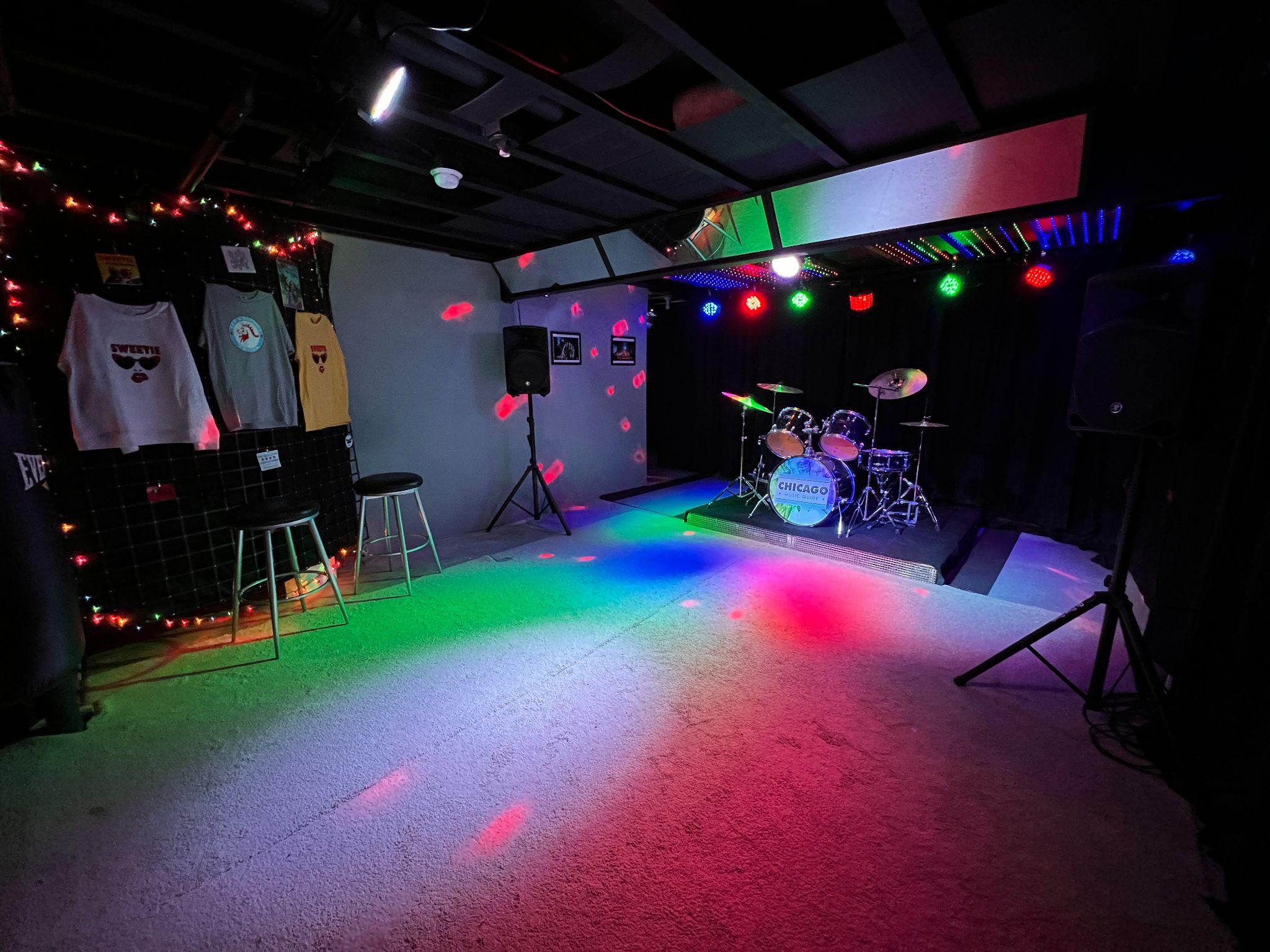
As you may have heard, Third Coast Review is a proud member of the Chicago Independent Media Alliance (CIMA), a group of nearly 40 independent Chicago-area media outlets who are determined to keep local media alive. Over the next two weeks, October 3–17, we are joining forces with all our fellow members for our third annual fundraising campaign. Through our diverse and eclectic voices, we hope to raise some money to help continue our mission to amplify Chicago Voices. The first two days of the fundraiser are especially important as donations to individual outlets will be double matched, essentially tripling your generous gift to your chosen CIMA member.
One of those CIMA members happens to be Chicago Music Guide with the wonderful Dennis Kelly at the helm. Founded in 2004, Chicago Music Guide is essentially a love letter to the dedicated music lovers across the globe. Their mission isng to be a valuable resource "dedicated to working with all entities of the music and entertainment industry." Their work is invaluable to artists and fans alike, specializing in giving them access to live music photography, reviews, interviews, news on the latest new music, event listings, and more!
I had the opportunity to ask Dennis about the webzine, from its beginning to where the amazing site will go to next. I highly suggest you check out Chicago Music Guide and consider donating to both our friends publication and Third Coast Review through CIMA's fundraising page.

Could you tell us about Chicago Music Guide’s focus?
Sure, thank you for featuring Chicago Music Guide, I really appreciate it The focus of Chicago Music Guide was originally to be more of a resource for musicians, but we’ve shifted more to music fans while still catering to musicians in a smaller degree.
What initiated the creation of Chicago Music Guide?
I was in a band back in the late ‘80s (the Killer Kitchen Utensils), but ended up leaving the band and filming them at some shows and rehearsals to continue to help them. The band ended up breaking up years later with the singer/guitarist going into another band. At this time (2000), I wanted to help his band by providing an online space to promote them with and soon I added other bands that I came to learn about and love and it all grew from there. It wasn’t until 2004 though where everything became more official with Chicago Music Guide.
How many people are currently contributing to the website?
About 10 people total.
Is Chicago Music Guide a for-profit?
Yes
What is the typical audience of Chicago Music Guide?
Approximately 58% male between the ages of 25-44
What type of articles does your audience gravitate to?
Reviews tend to be valued most overall.
How do you determine what Chicago Music Guide covers?
Whatever topics we cover, it always needs to be relevant to music or musicians in some way. A case in point, with COVID, we reported on the pandemic, but kept the focus on music venues and musicians and helped keep them informed as best we could.
Is there any area you would like to expand coverage on?
Well, since day one, I’ve had a glorious ‘vision’ for what I would like Chicago Music Guide to evolve into and, at times, in my efforts early on to try to make those visions happen, it hindered the growth at that time. Over time though, I concluded it was best to just simplify things, and expand only when there is enough revenue and staff to accommodate these plans. We’re not quite there yet, but hopefully, one day.
What are your thoughts on the current state of the Chicago music scene?
It seems to be getting back to the usual normal, which is to say, the usual struggles for bands to be discovered. Venues are still hurting, but that is not just the fault of COVID, but the overall economy isn’t helping that either.
Musicians though are adaptive and if they didn’t take the time to record new material during the lockdown, they livestreamed it and now they’ve finally been able to perform in person with their fans. So, there has been a lot of thankfulness and a renewed sense of connection with their fans again and for artists, that connection is a very important part of what they do. Much of the music these days has been very therapeutic for the artist and fans and performances a sense of group therapy (as was coined by Elohim for one of her tours), so, it is not just about having a good time, it is about community, a community of their peers who all share the same love of the artist.

With such a diverse range of venues in Chicago, which ones stand out to you?
My favorites are venues like the Chicago Theater, Genesee Theater, and even Metro and the Byline Bank Aragon Ballroom that have a lot of ornate details and ties to Chicago’s past. Though admittedly, I don’t get out to see too many shows personally, I’ve missed a lot of shows I would have loved to see at some very wonderful venues, unfortunately just due to time constraints.
What do you think of the “first 3 songs” rule for photographers covering shows?
I personally feel that it is a disservice to the bands as well as the photographers; oftentimes there are many great moments that happen during a show that do not always happen during the first three songs.
Photographers have a passion for what they do and to limit them on how many songs they can photograph and where they can photograph from just takes away from some of the best moments of the show leaving fans with cell phones to capture some of these moments in lesser quality levels.
There seem to be a lot of people that feel like you can’t succeed as a musician if you aren’t on the coasts (specifically LA and New York). Do you think that still holds true in this day and age?
Success comes in many different ways for artists, from viral videos to good old fashioned DIY tours across the country to, yes, heading to LA, sadly there have been many I’ve known who have moved there for their careers.
I don’t think there is any one true path to success for any artist; that path is always going to be unique to themselves, but remaining dedicated to their music and fans is one of the surest methods in all of those cases.
It seems like every year the bigger festivals get more and more pushback from the community, specifically noting the negative effects on the grounds and noise pollution. Do you think these festivals are taking the appropriate steps to fix these issues?
I am sure they are trying, but I honestly don’t feel locations like Douglass Park and Union Park are suited for festivals. Grant Park is by far the best for commuting to and it also has convenient hotel accommodations. If the cost of making Grant Park work for these individual festivals is too high, perhaps they should join forces and hold larger fests in the most appropriate space Chicago has to offer. But, that is my personal opinion, of course.
How did COVID affect the Chicago Music Guide?
Not too much thankfully other than not being able to go out to the shows. Our hearts were breaking though at witnessing the struggles everyone else was going through, such a devastating time it was and I am so glad we’re moving beyond it.
Tours are still being canceled due to the lingering effects of the pandemic and the current inflation woes, do you think touring will return to its old self soon?
Compared with last year, I think we’ve come a long way towards getting back to normal. Many venues have dropped their mask restrictions and the only cancellations I have seen have involved either members of the band or road crew who were infected and individual shows were canceled out of an abundance of caution.

What did you think of all the streaming concerts during the pandemic?
A good thing. A band out of Europe (Ad Infinitum) had just released their debut album right before everything shut down, so they decided to film a full performance to no audience and make it available for everyone to see.
Most bands did not have the luxury to do what they did of course, but it was pretty much the only way to keep things going. Some companies out there (similar to Zoom) even allowed for viewers to tip musicians through the streaming broadcast so musicians can still earn a little money.
Some venues like Rosa’s Lounge held their own streaming performances and many venues throughout the country all joined together through NIVA to try to stay afloat during this time.
Years before the pandemic though, I created a space in my home for bands to perform, which has been a continual work in progress and a major DIY project to say the least. I have hosted some performances already, but believe I am just about ready to include a very exclusive audience of 15-20 people that will be filmed and partially live streamed. The bands will be able to charge whatever they see fit and will get all proceeds brought in from these events. Most recently, I have even created a spot for bands to sell merchandise, so they’ll get 100% of ticket sales and merchandise sales along with a lot of promotional photos and videos to look forward to as well. I just have to work out getting a good audio mix from the board to be able to provide the artists with high quality recordings that they can take with them from each event. That is part of what I hope this fundraiser will help to fund this year so I can get even more local coverage than we’ve been able to do before.

With nearly two decades under your belt, what have been some of the highlights of covering the Chicago music scene?
Opportunities come and go, and I am thankful for each and every one we’ve been blessed with, but some of my greatest satisfactions have been just knowing that we’ve helped someone in their career just by doing what we do. We’ve done some benefit concerts over the years too and have raised money for nonprofits; I would love to do more of those, but time has really been too short for me and I would need someone more qualified who could coordinate that far better than I could.
What are artists your publication has not yet covered that you are hoping to feature?
There are a lot actually, some local artists that truly deserve more recognition that we’re working on getting more coverage for and others (not local) that I personally would love to cover that are a bit more eclectic that would be cool to still be able to make a connection with.
I had gotten a nice feather in my cap last year getting to cover KISS and I’ve been a big KISS fan growing up and always wanted to see them, but never did. Chicago Music Guide has covered them before, but I finally got to see them myself, and I wrote my review and Paul Stanley tweeted my review out to his followers. That was such an incredible experience, very unexpected and very appreciated.
Where do you see Chicago Music Guide in the next decade?
It is very hard to gauge given how long I’ve been running Chicago Music Guide, but where would I to see Chicago Music Guide in ten years? Helping local musicians, helping local businesses, helping up-and-coming writers and photographers to build their skills for their careers. I want Chicago Music Guide to serve the local community, amplify their voices and to be a place for inspiration. I know I will never get rich running Chicago Music Guide, but it has never been about that, it has been about experiencing the richness of helping others. As long as we can stay funded, I want Chicago Music Guide to be rich in helping the community.
Thank you very much once again for taking the time to feature Chicago Music Guide. I cannot thank you enough!
